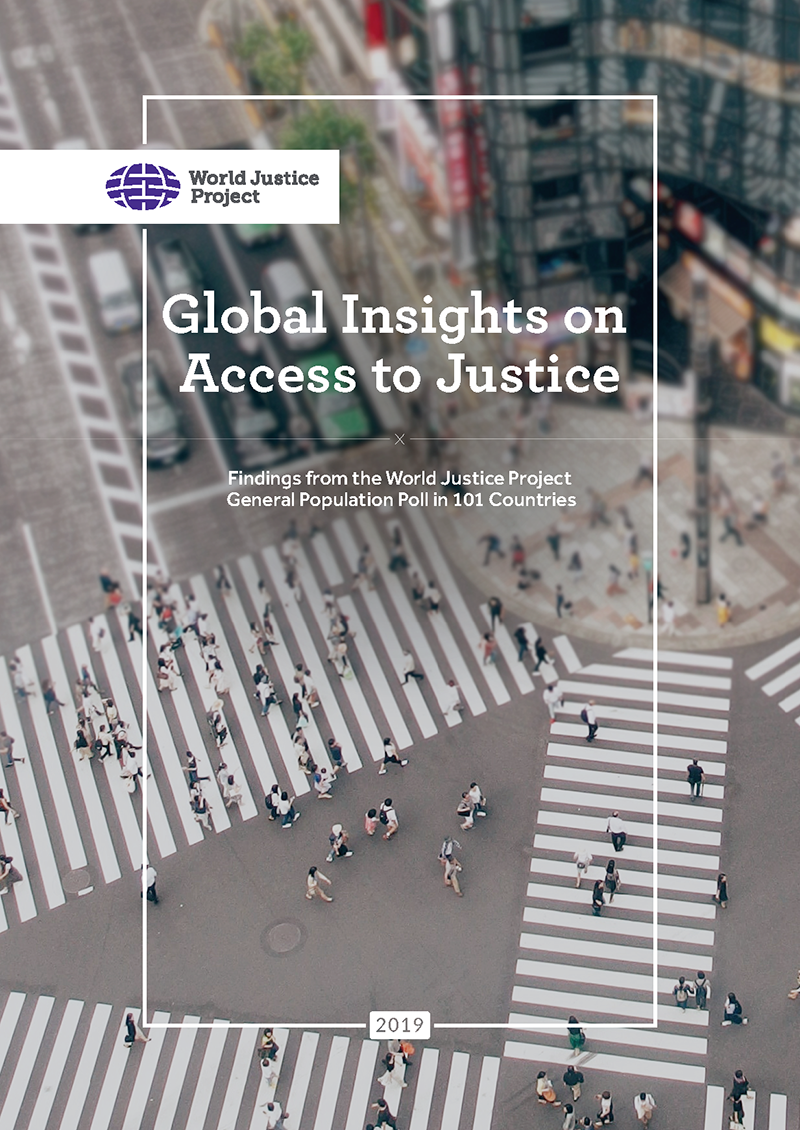
NEW YORK, NY (June 27, 2019) – The World Justice Project (WJP), an independent, multidisciplinary organization working to advance the rule of law worldwide, today released groundbreaking survey results on access to justice around the world, representing the voices of more than 100,000 people in 101 countries. Global Insights on Access to Justice 2019 is the first-ever effort to capture comparable data on legal needs and access to civil justice on a worldwide scale.
“This new data reveals the scope and depth of legal problems ordinary people face all over the world, including problems related to employment, housing, education, health, and family life,” said Elizabeth Andersen, executive director of the World Justice Project. “This should concern us all. These issues and how they’re addressed, or not, go to the heart of people’s social, economic, and physical well-being.”
Key findings from the study include:
- Justice problems are ubiquitous and frequent. Approximately half (49%) of people surveyed experienced at least one legal problem in the last two years. While the prevalence and severity of problems varies by country, the most common problems relate to consumer issues, housing, and money and debt. These can include problems with a landlord over rent, repairs, or payments; problems with neighbors over noise or litter; becoming homeless; disputes over poor or incomplete professional services; problems with a utility bill or supply; insurance claims being denied; threats from debt collectors; extortion from a gang or other criminal organization; difficulty collecting money owed to you; and more.
 Justice problems negatively impact people’s lives. 43% of those surveyed reported that their legal problem adversely impacted their lives. More than 1 in 4 people (29%) reported that they experienced physical or stress-related ill health as a result of their legal problem, and more than 1 in 5 people (23%) reported that they lost their job or had to relocate.
Justice problems negatively impact people’s lives. 43% of those surveyed reported that their legal problem adversely impacted their lives. More than 1 in 4 people (29%) reported that they experienced physical or stress-related ill health as a result of their legal problem, and more than 1 in 5 people (23%) reported that they lost their job or had to relocate.
- Most people do not turn to lawyers and courts. Less than a third (29%) of people who experienced a legal problem sought any form of advice to help them better understand or resolve their problem, and those who did seek assistance preferred to turn to family members or friends. Even fewer (17%) took their problem to an authority or third party to mediate or adjudicate their problem, with most preferring to negotiate directly with the other party.
- People face a variety of obstacles to meeting their justice needs, beginning with their ability to recognize their problems as having a legal remedy. Indeed, fewer than 1 in 3 people (29%) understood their problem to be legal in nature as opposed to “bad luck” or a community matter. As mentioned above, less than a third of those surveyed obtained advice from a person or organization that could help them better understand or resolve their problem, and 1 in 6 (16%) reported that it was difficult or nearly impossible to find the money required to resolve their problem. About the same proportion (17%) reported that their justice problem persists but they have given up any action to try to resolve it further, with another 39% reporting that their problem is still ongoing.
Other recent research by the World Justice Project underscores the magnitude of the global problem. According to WJP’s recent report, Measuring the Justice Gap, (published in May 2019), 1.4 billion people worldwide have unmet civil and administrative justice needs. Of the estimated 36% of people in the world who have experienced a non-trivial legal problem in the last two years, more than half (51%) are not able to meet their civil justice needs. Vulnerable groups – including low-income populations, recipients of government benefits, and the unemployed – are affected disproportionately; they are more likely to have legal problems and to experience a hardship as a result of their legal problem.
The new data arrives on the eve of the United Nation’s review of progress toward achieving the Sustainable Development Goals, including Goal 16’s commitment to ensure equal access to justice for all. Governments and civil society representatives from around the world will gather for the review in New York July 9-16, followed by a Summit meeting at the UN General Assembly in September.
“This report is a wake-up call to the legal profession and justice sector in rich and poor countries worldwide: access to justice is a fundamental quality-of-life issue, and our justice systems are failing people with often dire consequences,” said Elizabeth Andersen, WJP executive director. “We hope the globally comparable data presented in this report will provide a reliable, people-centered approach to understanding the problem and developing more effective solutions.”
The complete report—including country profiles, data visualizations, methodology, and download options—is available on June 27 at: https://worldjusticeproject.org/our-work/research-and-data/global-insights-access-justice
ABOUT THE WORLD JUSTICE PROJECT:
The World Justice Project (WJP) is an independent, multidisciplinary organization working to advance the rule of law worldwide. Effective rule of law reduces corruption, combats poverty and disease, and protects people from injustices large and small. It is the foundation for communities of justice, opportunity, and peace—underpinning development, accountable government, and respect for fundamental rights. Learn more at: www.worldjusticeproject.org
MEDIA CONTACT & INTERVIEW REQUESTS:
[email protected]
(206) 792-7676






